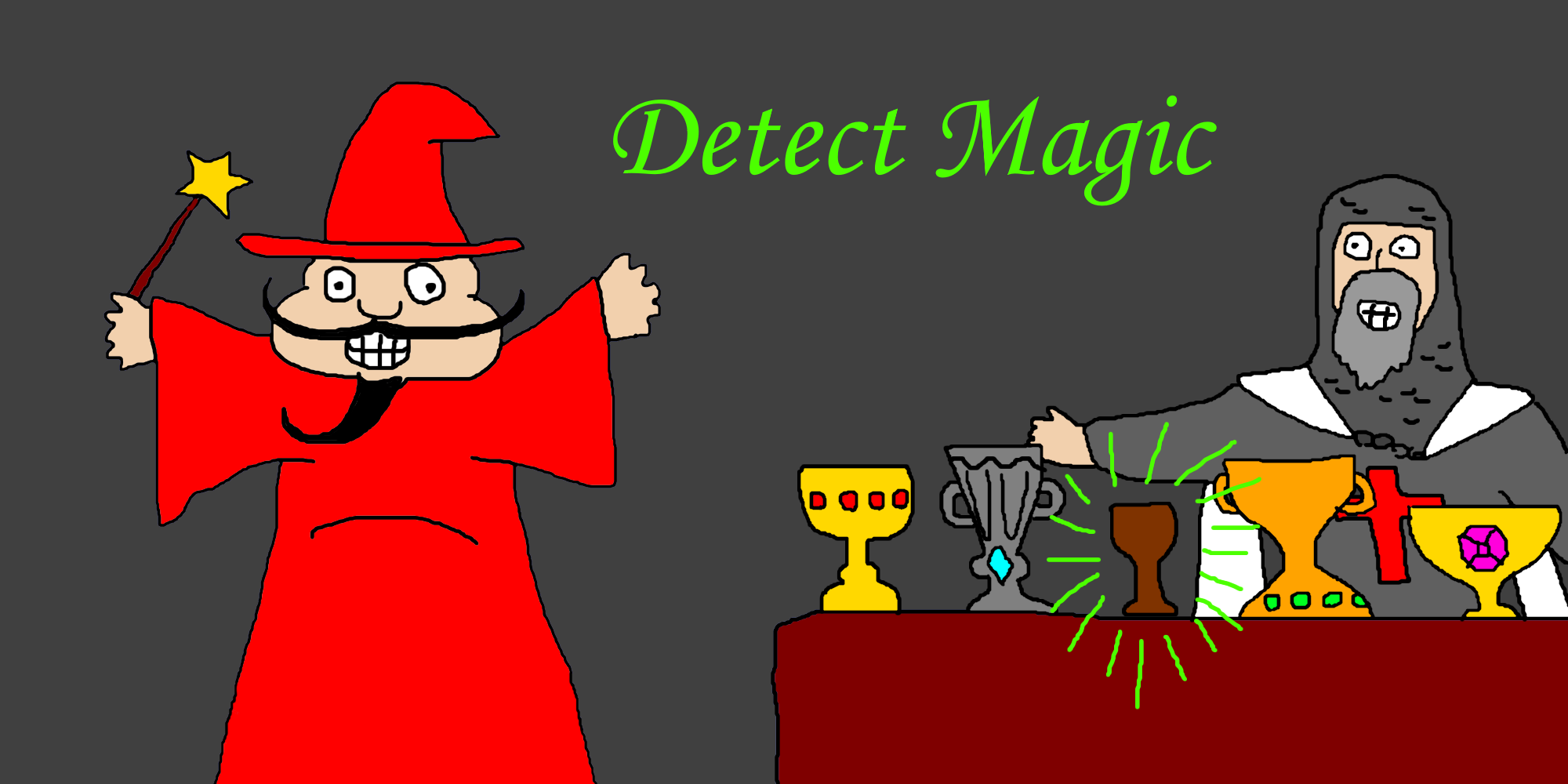Detect Magic: Choose Wisely
Usable By: Artificer, Bard, Cleric, Druid, Paladin, Ranger, Sorcerer, Wizard
Spell Level: 1
School: Divination (ritual)
Casting Time: 1 action
Range: Self
Duration: Concentration, up to 10 minutes
Components: V, S
For the duration, you sense the presence of magic within 30 feet of you. If you sense magic in this way, you can use your action to see a faint aura around any visible creature or object in the area that bears magic, and you learn its school of magic, if any.
The spell can penetrate most barriers, but it is blocked by 1 foot of stone, 1 inch of common metal, a thin sheet of lead, or 3 feet of wood or dirt.
Review by Sam West, Twitter: @CrierKobold
Oh, Detect Magic. You wonderful, messy, surprisingly complicated little spell. Detect Magic is on basically everyone but warlock’s spell list, and they even get an innovation to get it at will. This means regardless of party composition, so long as SOMEBODY can cast spells, Detect Magic is on the table. If you have one or more characters with ritual casting, Detect Magic is nearly an inevitability. Because at the end of the day, knowing whether or not something simply is or isn’t magical has tons of potential uses. Know what school of magic opens up the utility even further. Best of all, with a DM who is a bit flexible with how to manage and run it, it can be one of the coolest world exploration tools available. It also can feel completely uncastable and like it just drags the game to a halt.
Playing with Detect Magic on your sheet becomes pretty straightforward after a few uses. The play pattern that quickly appears with Detect Magic is “Do I have 10 minutes free? If yes, Detect Magic!” Its usually not costing you any resources because its a ritual spell, and gives you ten minutes of information gathering that can defeat hidden traps and secret entrances outright by simply acknowledging they’re there. If the puzzle was hidden in identifying something magical’s location, Detect Magic straightforwardly answers this problem. I’ve spoken at length as to how normally I’m opposed to this kind of problem solving, but in the case of Detect Magic, I’m a huge fan. It changes the requirements of a puzzle from passing a flat DC check to navigating and disarming a complex problem. For that reason alone, Detect Magic is a major boon to gameplay.
Beyond how it foundationally shifts traps and puzzles towards problem solving, Detect Magic also offers expanded depth and world building. If you’re DMing for players using Detect Magic, consider offering insight into emotions, histories, and feelings when the spell identifies an object as magical in addition to the regular information gained. Players are using Detect Magic to learn about the world around them and identify treasures, threats, or anomalies. The goal is specifically to learn; this is the perfect opportunity to give hints about magic in your worlds and engage your players directly with meaningful lore and information that can lead to actionable outcomes.
If you’re looking to run a more mundane world where magic is rare, mysterious, and exciting, Detect Magic can be a bit of an issue. A single magical object that appears mundane can facilitate some interesting puzzles and questions. A disguised character using illusion magic being immediately detected because of a single 1st level ritual spell isn’t always something you want at the table. If you’re planning on going towards a world where magic isn’t as prevalent as the Forgotten Realms and other traditional places, I’d consider talking to your players about avoiding it or adjusting how it works slightly. This won’t be an issue for the vast majority of groups, though.
All in all, while the spell has very few lines of text, the impact it has on gameplay by how pervasive it is overall leads to curious players getting tid bits of information that contribute to problem solving. Its the exact right balance of information gathering to me. If you’re in the market to learn about the world, I can’t recommend it enough, especially if you’ve got access to ritual casting.
If you’d like to support this ongoing project, you can do so by buying my books, getting some sweet C&C merch, or joining my Patreon.
The text on this page is Open Game Content, and is licensed for public use under the terms of the Open Game License v1.0a.
‘d20 System’ and the ‘d20 System’ logo are trademarks of Wizards of the Coast, Inc.
and are used according to the terms of the d20 System License version 6.0.
A copy of this License can be found at www.wizards.com/d20.



